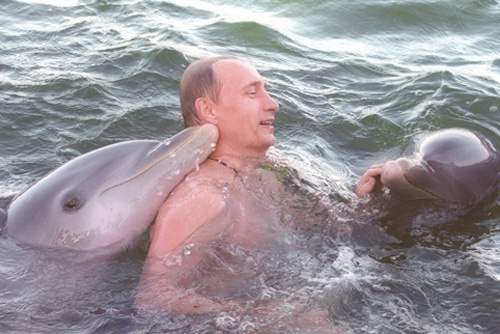Is globalization Russia's achilles heel?


A defiant President Barack Obama today refused to accept the legitimacy of the Crimea referendum to join Russia and announced the beginning of targeted economic sanctions, designed to pressure Moscow into reconsidering its actions toward the Ukraine.
It appears that the referendum will succeed with a whopping 97% majority voting in support of the ballot measure – a figure that doesn’t at all align with the ethnic and political map of the region. Russians are the largest ethnic majority on the peninsula, but comprise only 60% of the population. It’s very unlikely that the vote was legitimate, or fair.
The Obama administration has responded by freezing the assets of key Putin aids and Crimean officials that are associated with separatism. The European Union also approved its own sanctions today in coordination with the U.S. The U.S. has threatened additional sanctions should the Russian government annex Crimea.
The impact of any sanctions won’t be immediate, but anonymous U.S. officials told members of the press that the actions were designed to hit “close to home” for Russian President Vladimir Putin. The effect of Russia’s intervention in Ukraine has already impacted its economy; the stock market and ruble currency have fallen since the crisis began.
It’s a small world
However, Russia is much more a part of the world economy than the Soviet Union was. The turmoil caused by Russian’s intervention has affected more than its domestic fortunes – it’s also shaken global equities markets in Europe and the U.S., noted Northeastern University global management and innovation professor Daniel J. McCarthy.
The price of gold has increased, and that curiously benefits Russia, which has been increasing its holdings dramatically in recent years, McCarthy said. But that doesn’t mean that Russia would be insulated from a chill in global trade. Any attempt to retaliate against Europe by flexing its muscle as a large exporter of natural gas would also hurt it.
“Such actions would also further erode its credibility and add to distrust of Russia as a reliable supplier. Common sense would say Russia is unlikely to bring that on itself, BUT they have done it in the past including in 2009,” McCarthy explained, “Even though it would hurt the Russian economy, Putin would likely react with such retaliation if European countries were to join with the U.S. in embargos or attempts to expel Russia from the G8.” The economic ripples would be significant.
Russia supplies around 30% of Europe’s natural gas and 20% of other important fossil fuels. A disruption in trade could affect the price of products in Europe and throughout the world, McCarthy said. Further, any Russian military action in Ukraine – the world’s 2nd largest grain exporter – would upset world markets, which Russia now belongs to.
Russia could retaliate against global corporations and U.S. interests within its borders, which would ultimately harm businesses worldwide.
“One of the mismatches of the Ukraine conflict that makes it both dangerous and new is that Russia is conducting a 19th century foreign policy in a globalized world where actors are tied together economically as they have never been before,” said Edward Goldberg, a faulty member at NYU’s Center for Global Affairs and Baruch College adjunct.
Goldberg explored Russia’s interdependency with Europe further:
· “The EU is by far Russia's largest customer for energy. Russia supplies 31 percent of EU gas imports, 27 percent of crude oil imports, 24 percent of EU coal imports, 30 percent of total EU uranium imports, and is the EU's third-largest supplier of electricity.”
· This represents 88 percent of Russia's oil exports, 70 percent of its gas exports, and 50 percent of its coal exports.
· But equally important 40 percent of the Russian budget derives from the export of raw materials to the EU.
· Much of the natural gas from Russia to Europe passes through a maze of pipelines in the Ukraine. In principle Russia could threatened to cut off gas to Europe but in our interconnected world this would hurt Russia, the supplier as much as it would hurt Europe the customer.
Any military action in the Ukraine could also damage Russia’s ability to export its gas – many of its pipelines pass through Ukraine. A disruption in liquidized natural gas exports could also shape policy in the United States to export more LNG onto the world market. The U.S. is one of the world’s largest natural gas producers, but domestic pressure from the U.S. chemical industry not to export so that keep prices remain low would complicate matters, Golberg said.
What's more, the cost of infrastructure and changes in prices in the coming years could make increasing U.S. exports impractical, but it could be a powerful lever to pull in an economic conflict with Russia.
“If America begins to export LNG in substantial quantities it will have a direct economic impact on Russia. As an example, last year when on account of lack of US sales more mid-eastern LNG went to Europe, Gazprom, the Russian gas monopoly, was forced to renegotiate its contract down in Europe,” Golberg said.
Ultimately, the situation in Ukraine may be less about economics than Vladimir Putin’s political ambition and securing a 4th term as president, McCarthy said.
“He obviously believes that Russians like strong leaders and makes every attempt to look like a very strong leader: witness his proud buff appearance, his judo bouts, playing hockey, flying in fighter jets, and other such shows of bravado. The situation in Ukraine provides him an opportunity to show himself as that strong leader in the tradition of Peter the Great. It is his opportunity to exhibit his personal power and his country’s power to the world, possibly at the cost of Ukrainian independence.”
This post was originally published on Smartplanet.com